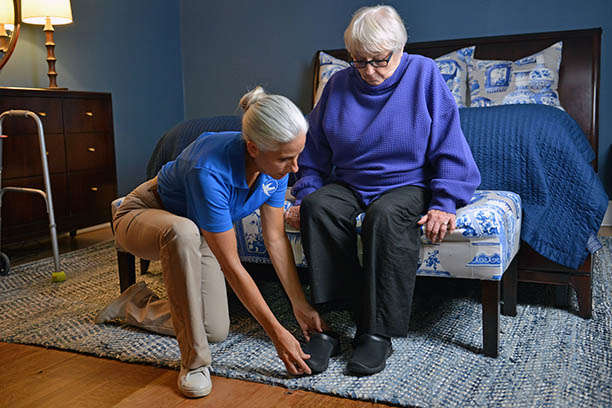
Alzheimer FAQ Answered by Alzheimer’s Disease Caregivers in Claremont
If you have a loved one who has recently been diagnosed with Alzheimer’s Disease, you likely have many questions. This FAQ gives you answers from Alzheimer’s disease caregivers at Visiting Angels of the Upper Connecticut River Valley.
What is Alzheimer’s?
Alzheimer’s disease is a progressive, degenerative brain disorder that is characterized by memory loss, cognitive decline, and behavioral changes. It is considered a terminal condition, with an average life expectancy of 4 to 8 years after diagnosis, though some individuals live 15 or 20 years after their initial diagnosis. Roughly 5.5 million Americans, the vast majority of whom are over the age of 65, are living with Alzheimer’s. Early Onset Alzheimer’s, on the other hand, affects approximately 200,000 Americans under the age of 65, according to the Alzheimer’s Association.
What is the Difference Between Dementia and Alzheimer's?
Dementia is an umbrella term for a wide range of brain disorders that are characterized by memory loss. Alzheimer’s is the most common type of dementia. Everyone with Alzheimer’s has dementia, but not everyone with dementia has Alzheimer’s. According to estimates, Alzheimer’s cases account for somewhere between 60% to 80% of all cases of dementia.
What are the Risk Factors for Alzheimer’s?
While scientists are still researching the exact cause of Alzheimer’s disease, researchers have identified a number of risk factors.
The three biggest risk factors are as follows:
- Advanced Age
- Genetics
- Heart Health
What are the Symptoms of Alzheimer’s?
Alzheimer’s disease caregivers recognize symptoms, particularly early signs of Alzheimer’s, through a person’s speech, thought patterns, and behaviors.
The most prominent symptoms include:
- Short-term and long-term memory loss
- Trouble solving simple problems
- Uncommon struggles with day-to-day activities
- Words forgotten or mixed up
- Items lost more frequently
- Confusion about current time or place
- Confusion about the names and identities of people
- Irrational, irritable, or depressed behaviors and actions
How Does Alzheimer’s Disease Progress?
Alzheimer’s is a gradual, progressive disease, with symptoms becoming worse over a period of years. At first, symptoms will be mild and will have minimal impact on the person’s well-being. By the final stages of the disease, the person may lose all short-term and long-term memory, the ability to speak and to understand speech, and the ability to perform basic personal activities, such as how to use the bathroom or eat on their own. Learn how to prepare for the stages of Alzheimer’s.
Does Alzheimer’s Disease Have a Cure?
Currently, there is no known cure for Alzheimer’s disease, but scientists continue to search for a cure. Modern treatments and clinical trials are limited to slowing the onset of the disease, delaying its initial symptoms, or reducing its progress.
What are the Options for Alzheimer’s Care?
As Alzheimer’s disease progresses, individuals living with the disease require Alzheimer’s disease caregivers to ensure their well-being and safety. One care option is to move your loved one into a nursing care facility. However, this can be traumatic for individuals with Alzheimer’s.
Another option is to hire Alzheimer’s disease caregivers, such as those offered by your local Visiting Angels of the Upper Connecticut River Valley. Visiting Angels' specialized home care is designed around the unique challenges of the disease and the recipient’s individual care needs.
Learn more about Alzheimer’s disease caregivers and Alzheimer’s care services offered by Visiting Angels today, or call 603-504-6080 to request a free consultation.
Serving Brattleboro to Hanover and the Surrounding Communities
Visiting Angels UPPER CONNECTICUT RIVER VALLEY, NH
24 Opera House Square Ste 209Claremont, NH 03743
Phone: 603-504-6080
Fax: 603-287-8495
